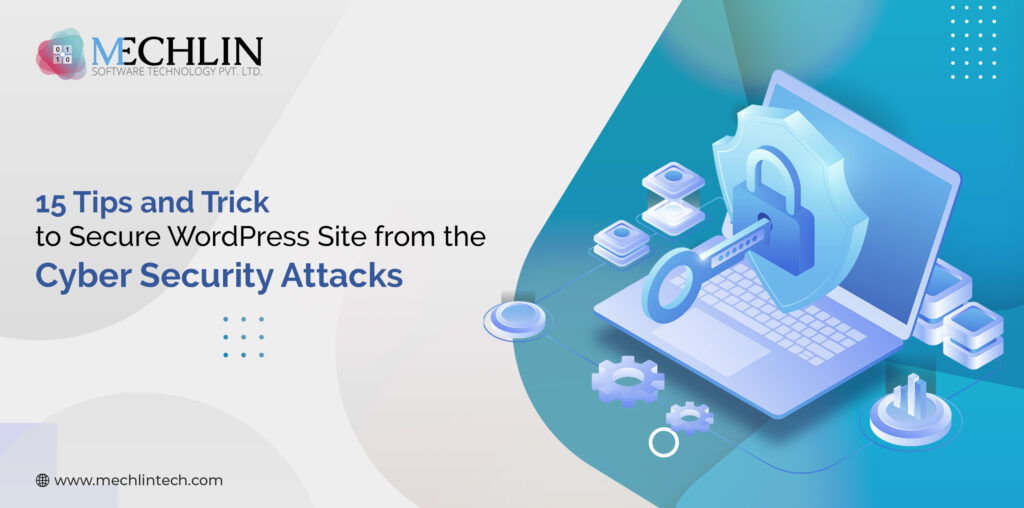15 Tips and Tricks to Secure WordPress Site from the Cyber Security Attacks

WordPress is one of the leading CMS for hosting any website. Undoubtedly it is effortless to use, but you can hire a WordPress developer of Mechlin Software Technology Pvt. Ltd. who will finish your project quickly. Of course, hosting of WordPress Website is easy, but the security issues always raise challenges for the website owner and WordPress Developer.
Is your Website developed using WordPress secured?
Are the passwords, credit cards, and personal information of your customers and visitors secure from the rising number of cyber security attacks?
Although hackers are making every effort, you should take additional precautions to secure your Website.
Learn why security is vital in this post, along with some steps you can take to safeguard your WordPress website.
Why Security Matters for WordPress?
Over 86 billion password assault attempts were thwarted in the first half of 2021, and 30,000 new websites are thought to be compromised daily on average.
The constant pursuit of websites and their sensitive data by hackers and different forms of malware.
The outcome?
An unprecedented number of cyber security attacks are happening now a day. All sizes of organizations, including yours, are impacted by this problem.
In actuality, only 14% of WordPress development sites of small firms are equipped to defend themselves from the 43 percent of internet attacks currently directed at them.
For more financial gain, many hackers target huge businesses.
Small and medium-sized firms, however, make an easier target for hackers since they lack the means and security knowledge to do so.
[Attacks are always inevitable. However, if you are not actively keeping up with your WordPress security, it isn’t easy to recover from one rapidly.]
Fortunately, numerous steps can help you safeguard your WordPress Development Website.
Let's discuss the Easy Security Basics. Following these tips and tricks can protect your WordPress Development Site from security threats.
1. Use strong passwords and secure logins
2. Reduce the user permissions
3. Limit user access rights
4. Pick a trustworthy hosting company.
Ask the hosting provider about their security measures. Please find out how they protect your Website’s security. Moreover, what if there is a security breach?
5. Purchase SSL certificates.
6. Put security plugins in place
7. Utilize a WordPress theme that adheres to WordPress standards.
8. Use the most recent WordPress update.
9. Make a backup.
11. Turn WordPress Monitoring on.
12. Monitor User Behavior
13. Preserve the Wp-Config.php File
14. Block file editing
15. Check the directory permissions once more
16. Turn on the website lockdown function.
Why is the security of your WordPress site important?
We shouldn’t overlook that WordPress sites are also susceptible to virus attacks when cyber security has become a significant issue for any business owner. If crucial elements like outdated plugins, themes, and the core software are not considered, it may experience security problems. Additionally, hackers or attackers might place spammy keywords on your high-ranking pages, which won’t instantly catch your attention. Crawlers can detect SEO spam, which is dangerous for your company.
It is preferable to remain awake from the start of your site development to avoid such unforeseen circumstances. Use high-quality plugins and abide by the ground principles above to make your Website safe. Therefore, before creating your WordPress Development website, follow the above criteria and avoid any potential cyber security threats.
Recent Posts
Categories
- Design (6)
- Development (26)
- Services (2)
- Technologies (9)
- Technology (4)
- Testing (10)
- Uncategorized (1)














